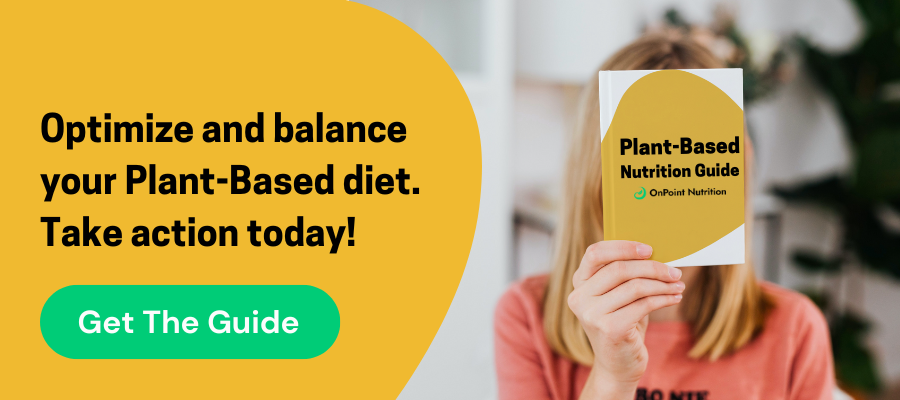
The terms vegan and vegetarian can seem similar and confusing. So what are the differences between the two? Is one stricter than the other? What can I eat on a vegetarian diet that I can’t consume on a vegan diet?
Well, (no shocker) both lifestyles exclude meat from the diet. Vegans and vegetarians exclude meat, seafood, fish, and poultry. However, veganism is much stricter than vegetarianism, as vegans also exclude any animal products i.e. dairy, eggs, honey and even leather and silk for the most dedicated.
Let’s talk about both of these diets, including their similarities and differences.
Vegetarian Diet
Under the definition of vegetarian by the Vegetarian Society, vegetarians are individuals who do not eat the products or byproducts of animal slaughter. These include:
- Meat (beef, pork, game)
- Poultry (chicken, turkey, duck)
- Fish and shellfish
- Insects
- Rennet, geletin, other types of animal proteins,
- Stock or fats that derive from animal slaughter
A vegetarian diet can include the following:
- Vegetables and fruits
- Grains and pulses
- Nuts and seeds
- Eggs
- Dairy products (milk, cheese, yogurt)
- Honey
Vegetarianism is typically less strict than veganism and can also include a variety of variations such as:
- Lacto-ovo-vegetarian (typical vegetarian who avoids meat but consumes dairy and eggs)
- Lacto-vegetarian (avoids meat and eggs but does consume dairy)
- Ovo-vegetarian (avoids meat and dairy products, but does consume eggs)
- Pescatarian (avoids all meat except for fish and shellfish)- typically also referred to as semi-vegetarian
Vegan Diet
Veganism is defined by the Vegan Society as “a way of living which seeks to exclude as far as is possible and practicable, all forms of exploitation of and cruelty to animals for food, clothing, or any other purpose and promotes the development and use of animal-free alternatives for the benefit of animals, humans and the environment.”
Vegans strictly avoid consuming any foods or beverages that contain:
- Meat
- Poultry
- Fish and shellfish
- Eggs
- Dairy products (milk, cheese, yogurt)
- Honey
- Insects
- Rennet, geletan, and other types of animal protein
- Stock or fats that derive from animals
Strict vegans also extend their avoidance beyond their diet and try to avoid any products that directly or indirectly involves the human use of animals such as
- Leather goods
- Wool
- Silk
- Beeswax
- Soaps, candles, and other products that contain animal fats
- Latex products that contain casein which comes from milk proteins
- Cosmetics or other products that manufacturers test on animals
Vegetarian and Vegan Health Benefits
Research has shown that following a plant-based diet can positively impact overall health. So what are the health benefits of eating vegan versus vegetarian? Which is “better”?
Both approaches are similar in that they generally encourage people to eat more antioxidant-rich and nutrient dense-foods. Both protocols have their unique advantages and disadvantages.
Vegetarian benefits
There are many health benefits associated with following a vegetarian diet. According to The Beginners Guide to Becoming Vegetarian, vegetarians may be up to 1/3 less likely to die or be hospitalized for heart disease. The heart protective benefits of the vegetarian diet include foods such as high fiber whole grains, legumes, nuts, vegetables and fruits, and other low glycemic foods. The idea is to consume soluble fiber and choose foods that will keep your blood sugar stable. Doing this reduces bad cholesterol and risk of a heart attack.
Following a healthy vegetarian diet may also help prevent and treat type 2 diabetes and its associated complications. Vegetarianism can help you manage type 2 diabetes because eating low glycemic foods keeps blood sugars steady. Diabetes-friendly vegetarian foods include whole grains, legumes and nuts.
Research has also found that individuals who don’t eat meat have lower blood pressure. Plant foods tend to be lower in fat, sodium, and cholesterol which can have a positive effect on blood pressure.
Vegan Benefits
Vegan diets also contribute positive health benefits. For starters, vegans tend to eat whole foods spanning grains, fruits, vegetables, beans, peas, nuts and seeds. These foods contribute many beneficial nutrients. Multiple studies have reported that vegan diets tend to provide more fiber, and antioxidants and are also richer in potassium, magnesium, folate, and vitamins A, C and E.
The vegan diet has also been shown to lower blood sugar levels and improve kidney function. Vegans tend to have lower blood sugar levels and higher insulin sensitivity and may have a lower risk of developing type 2 diabetes
The vegan diet is also linked to a lower risk of heart disease. Well planned vegan diets usually include large amounts of fresh fruits, vegetables and legumes, all foods high in fiber, which are linked to decrease the risk of heart disease. Observational studies comparing vegans with vegetarians and the general population report that vegans may benefit from up to a 75% lower risk of developing high blood pressure.
Avoid Nutrient Deficiencies
According to the authors published by the Journal of the Academy of Nutrition and Dietetics, carefully planned vegetarian and vegan diets are “healthful, nutritionally adequate, and may provide health benefits in the prevention and treatment of certain diseases.” However, it is important for vegetarians and vegans to ensure that they are eating a balanced and healthful diet that meets all their nutritional requirements.
While Lacto-vegetarians get calcium, phosphorus, and Vitamin D from dairy products, vegans may be deficient in certain vitamins and minerals only found in animal products. Plant foods do not naturally contain B12, which is an essential vitamin that supports the nervous system and cardiovascular health. It comes from fortified foods such as cereals and some types of plant-based milk. Vegans are also at risk for essential omega 3 fatty acid deficiency, specifically EPA and DHA, which is essential for normal brain function.
Although vegan diets are commonly higher in certain nutrients, poorly planned vegan diets may lead to deficiencies in several key nutrients. Therefore, it’s essential to choose plant foods AND fortified foods as well as certain supplements like B12 and D, zinc, and calcium.
Next Steps
To summarize the difference between vegetarians and vegans in simple terms:
- Vegetarians and vegans both choose to not eat meat or fish
- However, veganism is more strict, and prohibits the consumption of any products that come from animals including dairy, eggs, leather goods, wool and silk
- Vegetarians may eat dairy products that do not involve the slaughter of animals
- Both vegetarians and vegan diets may provide health benefits, including lower cholesterol levels and decreased risk of cardiovascular disease
- It is important for vegetarians and vegans to ensure that they are meeting all their nutritional requirements that they may not be getting through the diet
Our team helps people implement vegan and vegetarian lifestyles for many goals: weight loss, disease management, and improved quality of life. Visit our main page to learn more!

Topics

Shannon Gray is a Registered Dietitian at OnPoint Nutrition. Her expertise in plant based nutrition, built on personal experience and evidence based research, supports her passion to empower clients to include more plants, whole foods and habit change to support their health goals.




